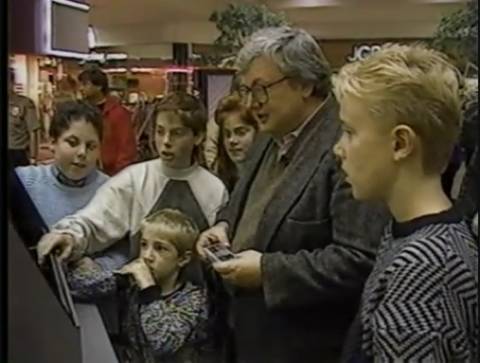For as long as I've loved games, I've loved movies as well. Those were my chosen escapes as a kid, the mediums I looked to when I needed to focus my attention on something other than reality. Console and computer games, of course, scratched a particularly interactive itch that my tiny child brain became just a bit more obsessed with. But right along side my gaming obsession, from just about the earliest age I can recall, was film.

Of course, like most kids, my attention was generally held by the things being advertised to me the most. Advertising tends to have a much more profound effect on a still-forming young mind than things like critical discourse, after all. Ironically, it was precisely this mentality that led me to start watching the decidedly critical Siskel & Ebert. I can't remember exactly how old I was when I first started watching the syndicated series, but certainly I was young enough to not really care too terribly much about what either of the titular film critics had to say. I mostly just watched the show because I liked the clips of the movies they were talking about.
I watched Siskel & Ebert for years that way. It wasn't until I was maybe 13 or 14 that a specific review caught my ear. It was for the 1994 debacle North, which starred Elijah Wood. Wood had briefly spent some time living in my hometown, which may have been the only reason my ears perked up at all when the two critics began savaging the film with a kind of abandon I'd scarcely ever seen. I'd seen them attack countless movies over the years, but the sheer brutality of their critiques as related to some actor I had only the most tenuous of connections to somehow woke me up. Suddenly, I was listening.
Though I always admired Gene Siskel, it was Ebert's review style that more often grabbed me. Even after Siskel's death in 1999, I kept watching the show, mostly because I found Ebert's editorial voice so engaging. When news of Ebert's death hit this past week, I realized that a big part of my experience with film was suddenly absent. I had been listening to Roger Ebert talk about movies for the better part of my life, and had always felt better off for it.
Early on, before the ubiquity of Internet access made reading his Chicago Sun Times reviews easily accessible to those outside of his region, it was strictly through his TV show. But even through that truncated form, Ebert's wit, thoughtfulness, and sheer depth of knowledge shined through. His conversational writing style was perfectly suited for the television audience, but as I learned later, it also shined wonderfully when read via the page. Ebert rarely came across as pretentious or snobby. Passionate, certainly. Zealous, even. But at its core, his writing always reflected a genuinely relatable man who simply loved movies with all of his being. Even if you vehemently disagreed with his assessments, you never questioned his competency as a critic and cinephile. His intentions and feelings were never obfuscated; he was as plainspoken as critics came.
In my earliest years as a critic of video games, I spent a lot of time trying to force myself into some tone of voice that I thought sounded distinctly "critical." Granted, I was barely 17 when I wrote my first paid reviews, and was only 21 when I started at GameSpot. It wasn't until the latter half of my tenure there that I started going back to old Roger Ebert reviews and reading them not just for entertainment purposes, but also as a learning tool. I tried to pick apart what it was that made him such a beloved critic, what it was about his prose or his structure or whatever else that embodied him. Eventually I realized that there wasn't any real secret sauce to it. Ebert's reviews were just an extension of his own natural voice. He was talking to his audience as he'd talk to any friend or acquaintance, albeit one that does not respond. His only trick was an assured mastery of his own distinctive voice, which he had shaped and refined into an effortlessly wielded instrument. Once I figured that out, I stopped trying to force myself into a voice that didn't feel like my own. While I believe I'm forever growing and learning as a writer, that lesson in particular is the one thing I always point to when trying to explain to people how I write.

Ebert's influence on me has been an incredible one, which made the news of his death difficult to parse. It was a crushing thing to hear, but seeing the effusive outpouring of love and support for the man and his work from just about every corner of the Internet has helped tremendously. Interestingly, lots of that support has come from corners I wouldn't have even expected. I mean, of course other film critics and filmmakers would signal his death as a tragic loss for their field, but seeing the video game quotient of my various social media feeds come out in equal support was perhaps a bit surprising.
After all, Ebert's relationship to video games had always been a contentious one. He had, on multiple occasions, declared that video games would never be "art," as the highest definition of the word is generally described. That position softened a bit in the last few years, though his lack of belief in games as a true art form was never fully shaken. As recently as 2010, he was still tearing through arguments in support of video games as art, albeit with a more considerate tone that showed he was at least willing to listen, if not necessarily agree. He even eventually conceded that his "never" declaration in regards to games as art was a foolish one, though he still noted that he had never experienced a game that met his qualification for the designation, nor did he have any strong desire to touch the many games people suggested to try and convince him otherwise.
Given this, you might think some in video games would see Ebert's death as a cause for some kind of perverse celebration; ding dong the wicked witch is dead, and all of that. But outside of a few decidedly trollish posts, I haven't really seen that anywhere. If anything, the video game industry seems to be taking Ebert's death just as hard as everyone else. Especially in the realm of criticism, where many of the writers of today are of a similar age and upbringing to myself. As it turns out, I was far from alone in my regular childhood watching of Siskel & Ebert. Countless critics and players have expressed similar appreciation for Ebert's influence not just on film criticism, but all of criticism as a greater whole.
And it's not as if Ebert actively hated games. Though he rarely expressed much appreciation for them, he has written positively of the experience of playing certain games. He had previously remarked that he had begun, and then abandoned a burgeoning Nintendo addiction back in the late '80s, and most notably, he adored the old school PC adventure game Cosmology of Kyoto. Ebert, in this regard, is not terribly dissimilar to many other people I have known who grew up during his era. While video games were most certainly born out of the creative drive of men and women from his generation, precious few of them went on to consume games with the same passion that they consumed other, more familiar (to them) forms of entertainment. Those of us who grew up with gaming of course had a far easier time embracing it as a medium worth our passion.
Roger Ebert didn't grow up around games, and never really developed a passion for them later in life. As a result, he mostly avoided playing them. To his credit, he was entirely explicit about this when asked, though that does present the question of why we kept on asking him, even after he told us he wasn't really interested. Why were we so concerned with his opinion on games in the first place?

I'm as guilty of this as anyone. In fact, it was barely within a day of Ebert's passing this week that I found myself at the end of BioShock Infinite. I'm not going to stand here and call Infinite art, because I don't care to try and make that specific designation for much of anything, really. I don't enjoy assigning potentially narrowing terminology to things, especially terms as nebulously subjective as the A-word. But watching as Infinite wound to its mind-bending conclusion, I couldn't help but wonder what someone like Ebert might have thought of Ken Levine's writing and direction, and whether a talent such as his shows the kind of promise for artistic merit that Ebert was looking for. Of course, even if he had still been alive for me to ask him, I doubt he would have responded to the query any differently than to those who had pestered him about Shadow of the Colossus, Journey, or any other number of games that struck them personally.
In thinking about this, and seeing the outpouring of love for the man following his death, I think I understand why so many so passionately argued at him--not necessarily with him, since he rarely conversed with people publicly on the subject--about the merits of games as art. After all, isn't it always our secret hope that those we admire will admire the same things we do?
I most certainly admired Roger Ebert. He taught me more about writing purely through example than I ever learned in school, and his sheer prolificacy stands as a constant reminder that I could, and should, always be trying to write something, so long as I have something to say. I may not have always agreed with his stances, especially when it came to video games, but much as Siskel and Ebert revered each other as much as opponents as friends, I loved to read his viewpoints, even when they wildly differed from my own. He was as brilliantly thoughtful a detractor as he was a champion for the things he loved. Whether or not Ebert is ever proven right or wrong about games as art hardly matters. What matters is that he challenged video games, much as he constantly challenged movies, to do better, to be better. And for that, among many other things, I'll always be grateful.
Log in to comment